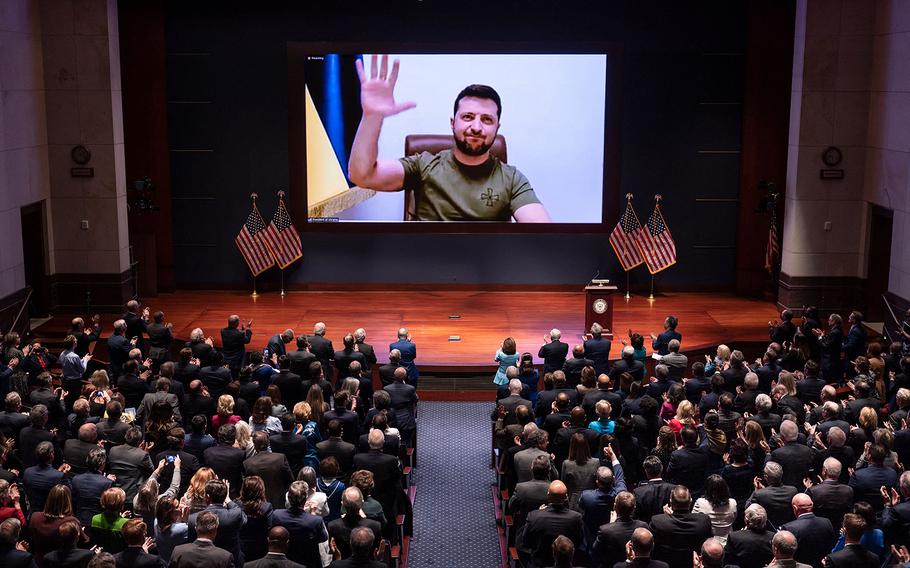
Ukrainian President Volodymyr Zelenskyy virtually addresses the U.S. Congress on March 16, 2022, at the US Capitol Visitor Center Congressional Auditorium, in Washington, D.C. (J. Scott Applewhite, Pool, AFP via Getty Images/TNS)
WASHINGTON (Tribune News Service) — The Biden administration is backing Ukrainian President Volodymyr Zelenskyy’s efforts to negotiate a peaceful end to Russia’s invasion of his country as it continued to accuse Russian forces of deliberately targeting civilians in what would amount to war crimes, top U.S. officials said Sunday.
“We have supported the negotiations that President Zelenskyy has attempted to do with the Russians,” Linda Thomas-Greenfield, U.S. ambassador to the United Nations, told CNN, though she quickly sought to temper expectations. “And I do use the word ‘attempted’ because the negotiations seem to be one-sided, and the Russians have not leaned into any possibility for a negotiated and diplomatic solution. ... But we’re still hopeful that the Ukrainian effort will end this brutal war.”
Zelenskyy had told CNN on Sunday that “without negotiations, we cannot end this war,” a day after calling for direct talks with Russian President Vladimir Putin to end the conflict.
“Russian forces have come to exterminate us, to kill us,” he said speaking through an interpreter. “If there is just a 1% chance to stop this war, we need to do that.”
Zelenskyy’s pleas come as Ukrainian officials on Sunday accused Russia of bombing an art school in the besieged city of Mariupol where hundreds had taken shelter. Zelenskyy in a daily address said the attack will “go down in history” as a war crime.
“The terror the occupiers did to the peaceful city will be remembered for centuries to come,” Zelenskyy said.
In a Saturday statement on Telegram, the city council of Mariupol said that “several thousand” residents had been taken to camps in Russian territory. Thomas-Greenfield said she could not confirm the reports but added it would be “unconscionable for Russia to force Ukrainian citizens into Russia, and put them in what will basically be concentration and prisoner camps.”
U.S. officials have been critical of Russian attacks on hospitals, schools and other infrastructure since it launched its invasion on Feb. 24. Defense Secretary Lloyd J. Austin III on Sunday accused Putin of targeting “cities, towns and civilians” because “he’s not been able to achieve the goals as rapidly as he wants to achieve.”
Austin said that Putin’s tactics were “disgusting” and that intentionally targeting civilians would constitute war crimes. His comments echoed those by President Joe Biden who last week called Putin a “war criminal.”
U.S. and Western officials are also concerned that Putin may order the use of chemical and biological weapons. To lay the groundwork for such an attack, the Kremlin has been leveling “spurious accusations that the U.S. was supporting Ukraine’s chemical weapons program,” Thomas-Greenfield said.
“This is a ‘false flag’ effort by the Russians,” she said. “They are advancing what they might intend to do. We have seen it happen before. They are the ones who’ve used chemical weapons. They used them in Syria. They have used chemical weapons against their own people. And we are concerned that they may use chemical weapons in Ukraine.”
The United Nations has said that nearly 900 civilians have been killed so far in Ukraine, and more than 3 million people have fled the nation, setting off a refugee crisis. NATO nations are scrambling to handle the potential humanitarian disaster while ratcheting up pressure on Putin to withdraw his forces.
Biden plans on traveling to Brussels to attend an emergency NATO summit to discuss measures the alliance can take to further counter Putin. Since the invasion, the U.S. and its allies have imposed stiff economic sanctions on the Kremlin, curtailed imports of Russian oil and restricted airspace to Russian commercial air traffic. In the hopes of stiffening Ukrainian resistance to the Russian onslaught, the U.S. and NATO members have boosted the flow of arms, humanitarian supplies and financial assistance to Kyiv.
While stressing the U.S. commitment to defending NATO countries against any Russian attack and bolstering its troop presence in Europe, Biden has said he will not dispatch troops to Ukraine. U.S. officials believe such a step would probably set off a broader conflict.
Zelenskyy has invited Biden to Kyiv, a trip that was ruled out on Sunday by Thomas-Greenfield and White House press secretary Jen Psaki. In a tweet, Psaki said the NATO summit “will be focused on continuing to rally the world in support of the Ukrainian people and against President Putin’s invasion of Ukraine, but there are no plans to travel into Ukraine.”
The invasion has not gone the way Putin and his military commanders had hoped. Much of the fighting throughout the country has reached a stalemate, according to experts and U.S. officials.
A report by the Institute for the Study of War, a Washington think tank, released on Saturday assessed that “Ukrainian forces have defeated the initial Russian campaign of this war.”
“The initial Russian campaign to seize Ukraine’s capital and major cities and force regime change has failed,” the report said.
©2022 Los Angeles Times.
Visit latimes.com.
Distributed by Tribune Content Agency, LLC.